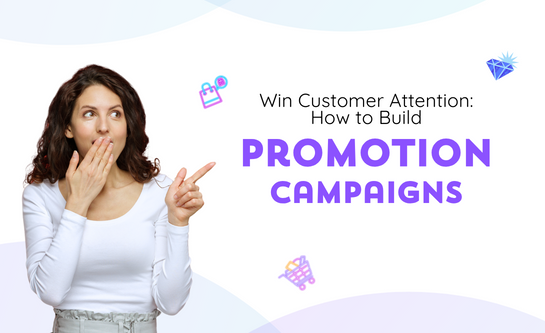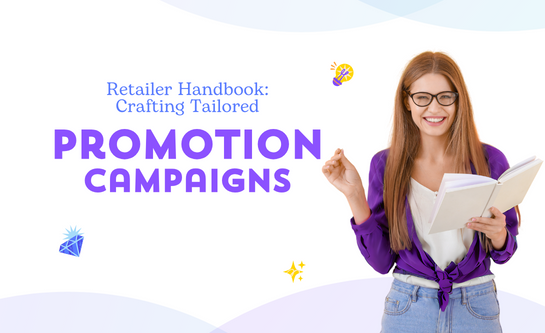Promotion in Marketing: A Comprehensive Guide
 Apr 24th, 2024
Apr 24th, 2024
 502 views
4 MINS READ
502 views
4 MINS READ
In marketing, promotion is a vital element, elevating brand visibility, boosting sales, and fostering consumer engagement. However, promotion in marketing is a complex concept, that involves diverse types and tactics, it is essential to select the right promotion activities that align with campaigns’ goals and consumers’ preferences.
This comprehensive guide dives into the nature of promotion in marketing, including its definition, types, benefits, real-life examples, and the latest trends that shape this ever-evolving landscape.
What is Promotion in Marketing?
Promotional marketing refers to the use of various tactics and strategies to promote and sell a product or service. It involves creating awareness, generating interest, and ultimately driving sales through targeted campaigns, special offers, incentives, and other promotional activities. These efforts are aimed at engaging with potential customers and encouraging them to make a purchase or take a desired action. The ultimate goal of promotional marketing is to increase brand visibility, attract new customers, retain existing ones, and ultimately boost revenue and profitability.
Types of Promotion in Marketing
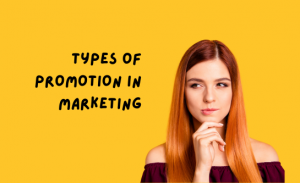
Promotional marketing includes multiple forms, each form is tailored to distinct marketing objectives and the preferences of the target demographic. Here are some fundamental types:
1. Advertising
Advertising is a form of the paid promotion of products or services across diverse channels such as television, radio, print, digital media, and outdoor spaces. These campaigns aim to spread brand awareness among a broad audience and often utilize appealing imagery, catchy slogans, and persuasive messaging to attract consumer attention.
2. Sales Promotion
Sales promotion strategies are created to stimulate immediate purchase behavior and boost short-term sales spikes. This comprises a chain of tactics including discounts, coupons, contests, sweepstakes, samples, and loyalty programs. All are crafted to encourage consumers to make purchasing decisions.
3. Public Relations (PR)
Public Relations refers to managing communication and fostering relationships with the media, influencers, and the public. Leveraging techniques such as media relations, press releases, event sponsorships, and influencer partnerships, PR tactics aim to nurture positive publicity and polish brand reputation.
4. Personal Selling
Personal selling revolves around one-on-one interactions between sales representatives and potential consumers. It involves conveying tailored product information, reducing concerns, and facilitating sales transactions. This personalized approach is particularly effective for products or services requiring detailed clarification or customization.
5. Direct Marketing
Direct marketing refers to the targeted communication directly with potential customers through various channels such as email, direct mail, telemarketing, or text messaging. This technique is often highly targeted and personalized. It uses customer data and insights to tailor messages to individual preferences and behaviors. This individualized approach allows businesses to bypass intermediaries like retailers or advertising platforms and establish a direct line of communication with consumers. It’s often used alongside other marketing strategies to reach specific segments and drive sales or generate leads.
Main Sales Promotion Types
Within the field of promotion marketing, sales promotion emerges as an important subset, especially focused on motivating purchase behavior through a chain of attractive incentives. There are some key types of sales promotion:
1. Discounts
Discount strategies refer to price reductions on products or services to attract consumers. This may comprise percentage discounts, BOGO offers, or seasonal sales events. All of them were applied to convey to consumers a sense of value and incentivize purchases.
2. Coupons
Coupons comprise vouchers that provide discounts or special offers upon redemption within a specified timeframe. They could be used in various marketing strategies such as referral programs, influencer programs, and new product launch campaigns. Whether created via print media, digital platforms, email newsletters, or mobile apps, coupons serve as potent tools for driving foot traffic, boosting online sales, and measuring campaign efficiency.
3. Contests and Sweepstakes
Contests and sweepstakes encourage consumer engagement through interactive competitions or prize draws. While contests require skill-based challenges or creative submissions, sweepstakes operate via random prize drawings. Both serve to create excitement around the brand and stimulate social sharing and user-generated content.
4. Samples
Sampling strategies involve the distribution of complementary product samples. It provides consumers with an opportunity to experience the product before deciding to make a purchase. Whether offered in-store, via direct mail, at events, or through digital platforms, samples serve to create trust, foster word-of-mouth recommendations, and facilitate trial and repeat purchases.
5. Loyalty Programs
Loyalty programs motivate repeat customers by rewarding them with exclusive perks, discounts, or points redeemable for future purchases. By fostering customer retention and nurturing enduring relationships, loyalty programs will be a key element for strengthening customer satisfaction and driving incremental sales, even for small businesses.
Benefits of Promotion Marketing
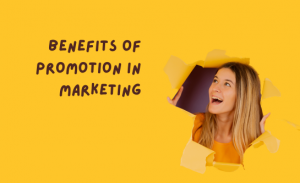
Promotion marketing provides huge benefits to businesses aiming to increase their market presence and strengthen their bottom line:
1. Amplified Brand Visibility
Promotional activities help businesses to enhance brand recognition and increase brand awareness among consumers. In detail, by capitalizing on the combination of channels and touchpoints, firms will approach a wider audience reach and engrave their brand image into the consumer’s mind.
2. Elevated Sales Trajectory
Compelling promotions motivate immediate purchase behavior, generating short-term sales rise and boosting revenue growth. By offering attractive incentives and discounts, businesses stimulate consumer action and drive a surge in sales volume.
3. Enhanced Consumer Engagement
Engaging promotional campaigns fosters interaction with the brand, nurturing robust relationships and fostering brand loyalty. Through the distribution of added-value content, engaging experiences, and personalized offers, brands drive higher levels of engagement and build meaningful emotional connections.
4. Competitive Edge
Strategic promotions differentiate a brand from competitors and attract consumers seeking value-added benefits. Offering special deals, exclusive promotions, or creative experiences can help businesses stand out in a competitive market and steal market share from competitors.
5. Invaluable Data Insights
Promotional tactics facilitate collecting valuable consumer data, enabling businesses to gain insights into their audience’s preferences and behaviors. By carefully evaluating consumer behavior, purchase patterns, and preferences, businesses draw actionable insights to optimize their promotional strategies and enhance campaign efficiency.
Promotional Campaign Ideas with Real-Life Examples
Real-life examples serve as evidence for the efficacy of promotion marketing. Here are some typical instances:
1. Nike’s “Just Do It” Campaign:
Nike’s iconic “Just Do It” campaign has surpassed normal marketing tactics to become a cultural touchstone. Supported by messages of determination and empowerment, the campaign motivated millions worldwide to follow an active lifestyle and associate the brand with athletic expertise.
2. Coca-Cola’s “Share a Coke” Campaign:
Coca-Cola’s “Share a Coke” campaign demonstrates the power of personalization in driving consumer engagement. By designing bottles with common names and phrases, the campaign fosters a sense of connection and motivates consumers to share their personalized Coke bottles, driving social engagement and strengthening relationships with the brand.
3. Amazon Prime Day:
Amazon’s annual Prime Day event has emerged as an icon case in the retail industry that offers exclusive deals and discounts to Prime members. By utilizing the psychological attraction of limited-time offers and exclusive perks, Prime Day motivates a crazy spending effect on consumers and creates a strong sense of urgency among them.
4. Starbucks’ Rewards Program:
Starbucks’ rewards program is a typical representative of the art of customer retention. By rewarding loyal customers with points for each purchase, Starbucks motivates repeat visits and nurtures long-term relationships. Hence, fostering brand loyalty and driving incremental sales.
5. Red Bull’s Extreme Sports Sponsorships:
Red Bull’s strategy sponsors extreme sports intending to emphasize its brand characteristic of adventure and high-energy living. By aligning with events such as the Red Bull Air Race and endorsing athletes like professional skateboarder Ryan Sheckler, Red Bull maintains exciting sentiments and reinforces brand identity among its target consumers.
Latest Trends in Promotional Marketing
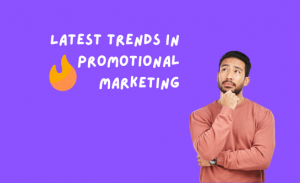
In the modern marketing era, promotion marketing continues to evolve together with emerging trends and technologies. There are some key developments in marketing regarding the integration of technology:
1. Influencer Marketing
Influencer collaborations are on the trend as brands utilize the influence of social media influencers to promote their products. By taking advantage of the credibility and impact of influencers, brands enter new markets and drive purchasing decisions through authentic endorsements.
2. User-Generated Content (UGC)
UGC emerges as a key promotional tool, with brands encouraging consumers to generate and share content. By spotlighting UGC across social media channels and marketing campaigns, brands foster community engagement and amplify their reach through authentic, relatable content.
3. Augmented Reality (AR) Experiences
AR technology revolutionizes promotional campaigns by providing immersive and interactive experiences. Brands deploy AR to craft virtual try-on experiences, interactive product demos, and gamified promotions. Hence, it will enhance brand engagement and stimulate consumer interest and conversion.
4. Personalization
Personalization becomes a backbone of marketing trends as brands leverage data analytics and AI to tailor promotions to individual consumer preferences. By delivering targeted messaging and offers, brands enhance relevance and resonance, boosting consumer engagement and amplifying conversion rates.
5. Sustainability Initiatives
Sustainability appears as a salient theme in promotion marketing, with brands aligning promotional efforts with eco-friendly practices. By integrating sustainability messaging into promotions, brands attract socially-conscious consumers, enhance brand reputation, and inspire consumer action in support of environmental causes.
Conclusion
Promotion marketing is a must-have element in any comprehensive marketing strategy. It offers various benefits to businesses seeking to bolster their market presence and drive sales. By embracing diverse sorts of promotional tactics, and catching up to the latest trends, brands can create memorable connections with their target audience and achieve their marketing objectives.
 Back to blog page
Back to blog page




























